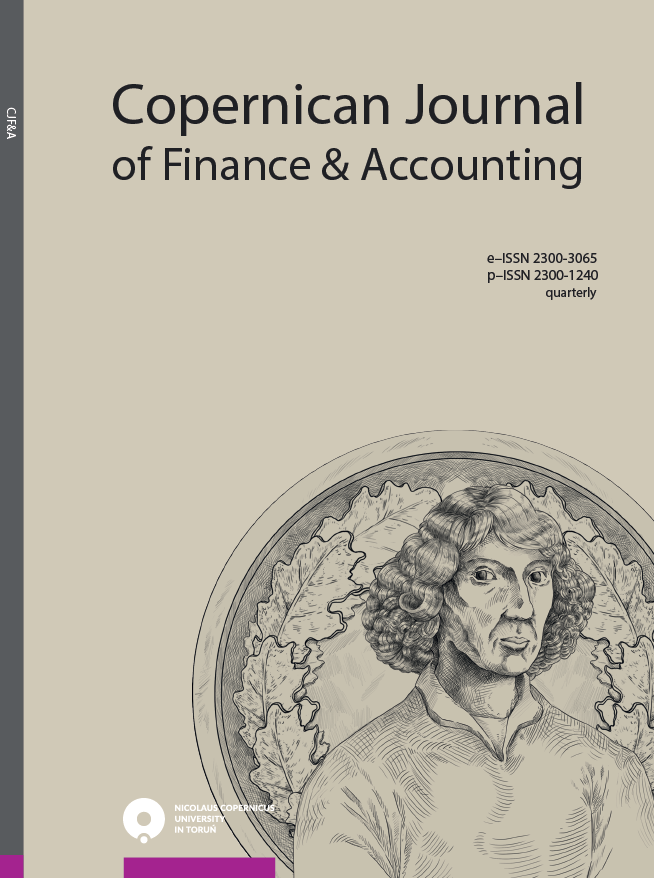The Impact of Female Executives on the Quality and Comparability of Financial Statements: Evidence from the U.S.
DOI:
https://doi.org/10.12775/CJFA.2024.012Klíčová slova
Financial Statement Comparability, gender, CFOAbstrakt
In this article, we examine the impact of female CFOs on Financial Statement Comparability (FSC) in a U.S. setting. Using a sample of publicly traded U.S. firms between the years 1992 and 2023, we compare firms with female CFOs against those with male CFOs using pooled panel regressions. We also examine firms with male to female CFO changes and vice versa using difference in difference regressions. We find that female CFO firms have a 1.1% higher FSC on average than male CFO firms. Further, firms that switch from having a male CFO to a female CFO experience FSC increases of 17.5%. On the contrary, firms that switch from having female CFOs to male CFOs experience FSC decreases of 7.6%. Thus, we conclude that firms with female CFOs have higher FSC than those with male CFOs. We believe that our findings are significant to regulators and legislators and also add supporting evidence in favor of the push for increased female representation in the C-suite.
Reference
Ahern, K.R., & Dittmar, A.K. (2012). The Changing of the Boards: The Impact on Firm Valuation of Mandated Female Board Representation. The Quarterly Journal of Economics, 127(1), 137–197. https://doi.org/10.1093/qje/qjr049.
Barua, A., Davidson, L.F., Rama, D.V., & Thiruvadi, S. (2010). CFO Gender and Accruals Quality. Accounting Horizons, 24(1), 25–39. https://doi.org/10.2308/acch.2010. 24.1.25.
Berger, A.N., Kick, T., & Schaeck, K. (2014). Executive board composition and bank risk taking. Journal of Corporate Finance, 28, 48–65. https://doi.org/10.1016/j.jcorpfin.2013.11.006.
Beu, D.S., Buckley, M.R., & Harvey, M.G. (2003). Ethical decision-making: a multidimensional construct. Business Ethics: A European Review, 12(1), 88–107. https://doi.org/10.1111/1467-8608.00308.
Catalyst (2023). Pyramid: Women in the United States Workforce (Infographic), https://www.catalyst.org/research/women-in-the-united-states-workforce/ (accessed: 10.08.2023).
Choi, J.H., Choi, S., Myers, L.A., & Ziebart, D. (2019). Financial statement comparability and the informativeness of stock prices about future earnings. Contemporary Accounting Research, 36(1), 389–417. https://doi.org/10.1111/1911-3846.12442.
Chun, R. (2005). Ethical Character and Virtue of Organizations: An Empirical Assessment and Strategic Implications. Journal of Business Ethics, 57(3), 269–284. https://doi.org/10.1007/s10551-004-6591-2.
Croson, R., & Gneezy, U. (2009). Gender Differences in Preferences. Journal of Economic Literature, 47(2), 448–474. https://doi.org/10.1257/jel.47.2.448.
De Franco, G., Kothari, S.P., & Verdi, R.S. (2011). The Benefits of Financial Statement Comparability. Journal of Accounting Research, 49(4), 895–931. https://doi.org/10.1111/j.1475–679x.2011.00415.x.
Faccio, M., Marchica, M.-T., & Mura, R. (2016). CEO gender, corporate risk-taking, and the efficiency of capital allocation. Journal of Corporate Finance, 39, 193–209. https://doi.org/10.1016/j.jcorpfin.2016.02.008.
Financial Accounting Standards Board (FASB) (1980). Statement of Financial Accounting Concepts No. 2: Qualitative Characteristics of Accounting Information. Norwalk, CT.
Financial Accounting Standards Board (FASB) (2010). Statement of Financial Accounting Concepts No. 8: Conceptual Framework for Financial Reporting. Norwalk, CT.
Folsom, D., Perez, R., & Wu, Q.C. (2024). How Does Managerial Entrenchment Relate to Financial Statement Comparability? SSRN Electronic Journal [Preprint]. https://doi.org/10.2139/ssrn.4133412.
Francis, B., Hasan, I., Park, J.C., & Wu, Q. (2015). Gender Differences in Financial Reporting Decision Making: Evidence from Accounting Conservatism. Contemporary Accounting Research, 32(3), 1285–1318. https://doi.org/10.1111/1911-3846.12098.
Francis, B.B., Hasan, I., Wu, Q., & Yan, M. (2014a). Are Female CFOs Less Tax Aggressive? Evidence from Tax Aggressiveness. Journal of the American Taxation Association, 36(2), 171–202. https://doi.org/10.2308/atax-50819.
Francis, J.R., Pinnuck, M.L., & Watanabe, O. (2014b). Auditor Style and Financial Statement Comparability. The Accounting Review, 89(2), 605–633. https://doi.org/10.2308/accr-50642.
Gupta, V.K., Mortal, S., Chakrabarty, B., Guo, X., & Turban, D.B. (2020). CFO Gender and Financial Statement Irregularities. Academy of Management Journal, 63(3), 802–831. https://doi.org/10.5465/amj.2017.0713.
Hinz, R.P., McCarthy, D.D., & Turner, J.A. (1997). Are women conservative investors? Gender differences in participant-directed pension investments. Positioning Pensions for the Twenty-First Century, 91, 103. Huang, J., & Kisgen, D.J. (2013). Gender and corporate finance: Are male executives overconfident relative to female executives?. Journal of Financial Economics, 108(3), 822–839. https://doi.org/10.1016/j.jfineco.2012.12.005.
International Accounting Standards Board (IASB) (2010). The Conceptual Framework for Financial Reporting. London, UK.
Jiang, J.X., Petroni, K.R., & Wang, I.Y. (2010). CFOs and CEOs: Who have the most influence on earnings management?. Journal of financial economics, 96(3), 513–526. https://doi.org/10.1016/j.jfineco.2010.02.007.
Kobayashi, N. (2021). Why gender diversity initiatives need a reboot, EY, https://www.ey.com/en_gl/women-fast-forward/why-gender-diversity-initiatives-need-a-reboot (accessed: 10.08.2023).
Linley, P.A., Maltby, J., Wood, A.M., Joseph, S., Harrington, S., Peterson, C., Park, N., & Seligman, M.E.P. (2007). Character strengths in the United Kingdom: The VIA Inventory of Strengths. Personality and Individual Differences, 43(2), 341–351. https://doi.org/10.1016/j.paid.2006.12.004.
Lu, H., Shin, J.-E., & Zhang, M. (2023). Financial reporting and disclosure practices in China. Journal of Accounting and Economics, 76(1), 101598. https://doi.org/10.1016/j.jacceco.2023.101598.
McKinsey & Company (2022). Women in the Workplace 2022, https://www.mckinsey.com/featured-insights/diversity-and-inclusion/women-in-the-workplace (accessed: 10.08.2023).
Revsine, L., Collins, D.W., Johnson, W.B., Mittelstaedt, F., & Soffer, L.C. (2012). Financial reporting and analysis. McGraw Hill.
Sinha, T. (2023). The role of female leadership in times of financial crisis – An analysis during the COVID-19 pandemic. Copernican Journal of Finance & Accounting, 12(2), 79–98. http://dx.doi.org/10.12775/CJFA.2023.012.
Wang, F., Zhang, Z., Ho, L.C.J., & Usman, M. (2023). CFO gender and financial statement comparability. Pacific-Basin Finance Journal, 80, 102100. https://doi.org/10.1016/j.pacfin.2023.102100.
Wechsler, P. (2015). Women-led companies perform three times better than the S&P 500, Fortune, https://fortune.com/2015/03/03/women-led-companies-perform-threetimes-better-than-the-sp-500/ (accessed: 10.08.2023).
Stahování
Publikováno
Jak citovat
Číslo
Sekce
Licence
Copyright (c) 2025 Xiang (Gail) Gao, Emmanuel Sequeira, Qifeng (Charles) Wu

Tato práce je licencována pod Mezinárodní licencí Creative Commons Attribution-NoDerivatives 4.0.
Stats
Number of views and downloads: 350
Number of citations: 0



